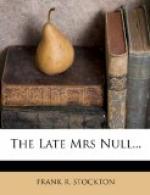This letter took a long time to write, and was very carefully constructed. With outstretched hands, Mr Brandon met the old lady on the very threshold of her proposition. He stated that nothing would please him better than an immediate wedding, and that he would have proposed it himself had he not feared that the lady would consider him too importunate. (This expression was suggested by Colonel Macon.) In order that they might lose no time in making themselves happy, Mr Brandon proposed that the marriage should take place in a week, and that the ceremony should be performed in Richmond. (The colonel wished him to say that he would immediately go to her house for the purpose, but Mr Brandon would not consent to write this. He was afraid that the widow would sit at her front door with a shot-gun and wait for him, and that some damage might thereby come to an unwary neighbor.) Each of them had many old friends in Richmond, and it would be very pleasant to be married there. He intended to start for that city in a day or two, and he would be rejoiced to meet her at eleven o’clock on the morning of the fifth instant, in the corridor, or covered bridge, connecting the Exchange and Ballard hotels, and there arrange all the details for an immediate marriage. The letter closed with an earnest hope that she would accede to this proposed plan, which would so soon make them the happiest couple upon earth; and was signed “Your devoted Robert.”
“By which I mean,” said Mr Brandon, “that I am devoted to her destruction.”
The letter was read over by Colonel Macon, and highly approved by him. “If you had met that woman, sir, when she first came to you,” he said to Mr Brandon, “with the spirit that is shown in this letter, you would have put a shiver through her, sir, that would have shaken the bones out of her umbrella, and she would have cut and run, sir, before you knew it.”
The messenger from Howlett’s was kept at Midbranch all night, and the next morning he was sent back with Mr Brandon’s note. Two days afterward Colonel Macon and Mr Brandon started for Richmond, and in the course of a few hours, they were comfortably sipping their “peach and honey” at the Exchange and Ballard’s.
The next day was most enjoyably spent with a number of old friends; and in reminiscences of the past war, and in discussions of the coming political campaign, Mr Brandon had thrown off every sign of the annoyance and persecution to which he had lately been subjected.
“By George, sir!” said Colonel Macon to him the next morning, “do you know that you are a most untrustworthy and perfidious man?”
“Sir!” exclaimed Mr Brandon, “what do you mean?”
“I mean,” replied Colonel Pinckney Macon, with much dignity, “that you promised at eleven o’clock to-day to meet a lady in the corridor connecting these two hotels. It wants three minutes of that time now, sir, and here you are reading the ‘Dispatch’ as if you never made a promise in your life.”




